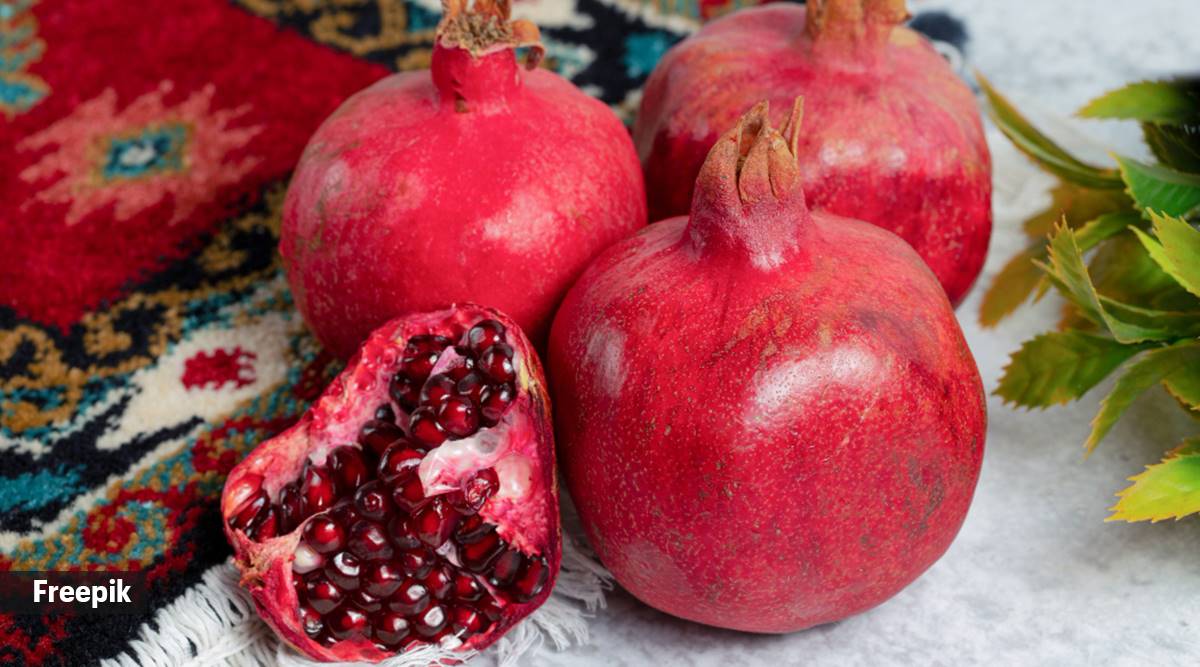📣 For more lifestyle news, click here to join our WhatsApp Channel and also follow us on Instagram
Nutrition alert: One pomegranate (250 grams) contains…
If you experience any adverse reactions after consuming pomegranate, such as itching, swelling, or difficulty breathing, seek medical attention immediately
 Pomegranates are rich in antioxidants, particularly polyphenols, which may help reduce inflammation and protect against oxidative stress (Pic source: Freepik)
Pomegranates are rich in antioxidants, particularly polyphenols, which may help reduce inflammation and protect against oxidative stress (Pic source: Freepik)Pomegranate is a delicious and nutritious fruit that can be enjoyed as part of a balanced diet. Packed with umpteen health benefits, they are good for the heart, blood pressure, and also show anti-cancerous properties. In fact, some studies also suggest that pomegranates are wonderful for brain health and can help fight Alzheimer’s disease.
Speaking with indianexpress.com, G Sushma – Consultant – Clinical Dietician, CARE Hospitals, Banjara Hills, Hyderabad, said, “Pomegranates contain various compounds, such as antioxidants and polyphenols, which have been associated with potential brain-protective effects. These compounds help reduce oxidative stress and inflammation, which are known to contribute to the development and progression of neurodegenerative diseases.” However, more research is required to establish pomegranate’s positive impact on Alzheimer’s disease, she added.
The nutritional profile of one pomegranate
The following is an approximate nutritional profile for 250 grams (8.8 ounces) of pomegranate arils (the edible seeds and juice sacs):
– Calories: 150
– Carbohydrates: 38 grams
– Dietary fiber: 11 grams
– Sugars: 26 grams
– Protein: 2 grams
– Fat: 1.5 grams
– Vitamin C: 28 milligrams (47% of the daily recommended intake)
– Vitamin K: 46 micrograms (58% of the daily recommended intake)
– Folate: 107 micrograms (27% of the daily recommended intake)
– Potassium: 533 milligrams
– Other vitamins and minerals present in smaller amounts include vitamin E, vitamin B6, thiamine, riboflavin, niacin, calcium, magnesium, and phosphorus.
 Pomegranates contain compounds like ellagitannins and punicalagins, which have shown potential anti-cancer effects in studies (Pic source: Freepik)
Pomegranates contain compounds like ellagitannins and punicalagins, which have shown potential anti-cancer effects in studies (Pic source: Freepik)
Health benefits of pomegranate
Pomegranates have been associated with numerous health benefits. Some of the key potential benefits, as shared by G Sushma, include:
– Heart health: Pomegranates are rich in antioxidants, particularly polyphenols, which may help reduce inflammation and protect against oxidative stress, both of which can contribute to heart disease. Pomegranate juice has been shown to improve blood pressure, reduce cholesterol levels, and enhance overall heart health.
– Anti-cancer properties: Pomegranates contain compounds like ellagitannins and punicalagins, which have shown potential anti-cancer effects in studies. They may inhibit the growth of cancer cells, particularly in breast and prostate cancers. However, more research is needed to fully understand their impact.
– Brain health and Alzheimer’s disease: Some studies suggest that the antioxidants in pomegranates may help protect against oxidative stress and inflammation in the brain, which are key contributors to neurodegenerative diseases like Alzheimer’s. While promising, more research is required to establish a definitive link.
Can diabetics also have pomegranate?
Pomegranate is relatively high in natural sugars, so it’s important for individuals with diabetes to moderate their intake. “Consuming the whole fruit in moderate amounts as part of a balanced diet is generally considered safe,” said Sushma. However, it’s advisable for diabetic patients to consult with their healthcare provider or a registered dietitian to determine the appropriate serving size and frequency.
 While pomegranates offer various health benefits, it’s important to consume them in moderation as part of a balanced diet (Pic source: Freepik)
While pomegranates offer various health benefits, it’s important to consume them in moderation as part of a balanced diet (Pic source: Freepik)
Things to keep in mind
When consuming pomegranate or its juice, here are a few things to keep in mind, as suggested by Sushma.
– Allergies: Some individuals may be allergic to pomegranates. If you experience any adverse reactions after consuming pomegranate, such as itching, swelling, or difficulty breathing, seek medical attention immediately.
– Interactions with medications: Pomegranate may interact with certain medications, particularly blood thinners like warfarin. If you’re taking any prescription medications, it’s advisable to consult your healthcare provider before regularly consuming pomegranate or its juice.
– Moderation: While pomegranates offer various health benefits, it’s important to consume them in moderation as part of a balanced diet. Excessive consumption may lead to unwanted effects such as digestive issues or an increase in blood sugar levels.
– More research required: While pomegranate have been associated with potential health benefits, it’s important to approach their effects on specific conditions, such as brain health and Alzheimer’s disease, with caution. The research on pomegranates is still evolving, and more comprehensive studies are needed to establish their full impact.
📣 For more lifestyle news, follow us on Instagram | Twitter | Facebook and don’t miss out on the latest updates!
📣 For more lifestyle news, click here to join our WhatsApp Channel and also follow us on Instagram
Photos



- 01
- 02
- 03
- 04
- 05
























